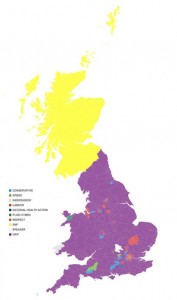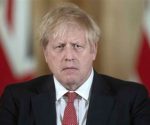“Tory victory” GE2015 narrative wrong; real winner now attracting media’s post-election ire
 When the BBC’s exit poll was announced on the night of 7th May, certain politicians and political commentators expressed incredulity. Previously, the opinion polls had had Labour and the Tories neck and neck – now it looked as if the Tories would win by quite the margin. The exit poll was a surprise to the author, too, who never believes opinion polls and who predicted enough UKIP seats to force some drastic repositioning amongst the LibLabCon to do whatever needed to be done to continue its agenda. The explanation for the result, we were told, was a reaction to the threat of a SNP coalition with Labour. We were led to believe that the corporate-media and the Conservatives, with their negative campaigning, had apparently scared Tory voters back into the fold – and so presumably away from UKIP. However, after some time for consideration has passed, this story begins to look like cover for something else that lies actually partly just beyond the scope of this article (an explanation to follow). Although the size of the promised SNP result did in fact materialise, their performance, regardless of its scale, would never make any difference to what a LibLabCon Westminster Government has planned for Scotland – i.e. for it to be a direct EU province. So, the SNP threat story had always been a decoy – and now we can see what for. Despite what we are told by the Westminster Bubble, General Election Day 2015 was a resounding success for UKIP and the anti-EU forces in the country. However, the unexpected Tory win is not only excused by the SNP decoy, but made to look spectacular because of how the bogey-man of Labour+SNP in office has been slain in the process, and this turns our attention away from the really significant development. Post-election, we were sold a story of how “leftism” – a redundant term of divide and conquer – is temporarily defeated and the “right” has won, but the real divide in politics remains, and the side that UKIP is on has been made stronger. Even though the British electorate has apparently given a pro-EU Tory Government carte-blanche to rubber stamp EU legislation and continue to lead them ever more into national oblivion, Britons who are looking to overthrow the unlawful rule of the vassal government that clings on in Westminster are better placed than ever before to do it. This is what is being disguised under the froth of all the Establishment baloney.
When the BBC’s exit poll was announced on the night of 7th May, certain politicians and political commentators expressed incredulity. Previously, the opinion polls had had Labour and the Tories neck and neck – now it looked as if the Tories would win by quite the margin. The exit poll was a surprise to the author, too, who never believes opinion polls and who predicted enough UKIP seats to force some drastic repositioning amongst the LibLabCon to do whatever needed to be done to continue its agenda. The explanation for the result, we were told, was a reaction to the threat of a SNP coalition with Labour. We were led to believe that the corporate-media and the Conservatives, with their negative campaigning, had apparently scared Tory voters back into the fold – and so presumably away from UKIP. However, after some time for consideration has passed, this story begins to look like cover for something else that lies actually partly just beyond the scope of this article (an explanation to follow). Although the size of the promised SNP result did in fact materialise, their performance, regardless of its scale, would never make any difference to what a LibLabCon Westminster Government has planned for Scotland – i.e. for it to be a direct EU province. So, the SNP threat story had always been a decoy – and now we can see what for. Despite what we are told by the Westminster Bubble, General Election Day 2015 was a resounding success for UKIP and the anti-EU forces in the country. However, the unexpected Tory win is not only excused by the SNP decoy, but made to look spectacular because of how the bogey-man of Labour+SNP in office has been slain in the process, and this turns our attention away from the really significant development. Post-election, we were sold a story of how “leftism” – a redundant term of divide and conquer – is temporarily defeated and the “right” has won, but the real divide in politics remains, and the side that UKIP is on has been made stronger. Even though the British electorate has apparently given a pro-EU Tory Government carte-blanche to rubber stamp EU legislation and continue to lead them ever more into national oblivion, Britons who are looking to overthrow the unlawful rule of the vassal government that clings on in Westminster are better placed than ever before to do it. This is what is being disguised under the froth of all the Establishment baloney.
Getting now into the facts and figures, if we compare the votes for each party in the 2010 and 2015 elections against the respective turnouts, we find some very interesting results. In 2010, 10.7 million people voted Tory in a national turnout of 29.7 million. If the same proportion had voted for the Tories in 2015, where the turnout was 30.7 million, then the size of that constituency would have been 11,080,028. This number is only 250 thousand less than the actual 2015 result. In real terms, the Tory vote only grew by 2% of the 2010 result. As for UKIP, in 2010, a mere 919,546 (the author amongst them) expressed their support with a vote. If the same proportion had voted UKIP in 2015, the result would have seen a measly 950,501 votes. In fact, this time UKIP received 2.9 million votes more than that. In real terms, UKIP’s vote grew by 308%. The exact same development can be seen in the vote-share-change figures where the Tories only managed a 0.8% increase from 2010 – UKIP saw a 9.5% increase. The great myth that has already been peddled and sold is not true. There was no great Tory victory in the 2015 election – the party still has roughly the same level of support that could only muster a coalition in 2010. It is UKIP that has made the most tremendous impact, and has changed the political landscape, and that is no doubt why the corporate-media is going after it so furiously: the Establishment is perhaps frightened witless, which is further suggested by the rapidity with which the Tories are moving ahead with some very suspect policies that, after only a little investigation, will reveal themselves to be in accordance with and conducive for EU rule.
As much mileage as the idea of the Labour+SNP bogey-man has had, we need to view it in the context of this massive growth in UKIP. In doing this we can see that in fact, if it did have any effect at all, then it only mitigated UKIP’s growth rather than hand the Tories a stunning victory. Indeed, it could be argued that the actual scale of the SNP-threat effect was negligible – after all, the Labour vote grew slightly more than the Tories’ did, and it looks on the face of it that the collapsed Lib Dem vote propped the Tories up; (the author always predicted a merging of the support of those two parties). In truth, or as it appears to the author at least, the threat of a Labour-SNP coalition did not generate a major Tory burst.
Of course, if we are puzzled about a few things regarding this election just gone, we cannot be mystified about how the Great Tory Victory narrative came to be established. Before the election the ever-so-compliant corporate-media – none less strident than the Tories’ flagship propaganda mouthpiece, the Daily Mail – was crucial in being seen to frighten its readership – usually Middle England Tories. The way it did this was by writing the threat of a Labour-SNP coalition large into the imaginations of people. Labour and the Scottish Nationalist Party would form a partnership, and the SNP would extract all sorts of concessions out of the senior member in the relationship – to the detriment of the English. The author didn’t follow much of this fear mongering, but gathers the preceding sentence an adequate representation of what was the spirit of the threat being made.
However, against the theoretical power to influence that the corporate-media has evidently had, and to some degree still wields, the author sets the increasing awareness in the public of the phenomenon known as a “psychological operation”. The author is coming to think that perhaps the British electorate is growing out of its historical naivety whereby it is increasingly resistant to the sort of manipulation by the “authoritative voice” that has been able to work so well in the past. For surely, pre-election, from hard and expanding experience, people could see that a Tory party that has a majority – just as a Labour one would – could rubber stamp EU legislation with impunity. On the other hand, a coalition government, opposed by a kernel of UKIP MPs with which Labour and Tory rebels might find some common cause, had the potential to be a spanner in the works – in the context of current British politics where the LibLabCon are obviously firmly set upon an agenda separate to that of the people it is supposed to represent, Government is best when it finds it hard to legislate against them.
The more one considers the matter, the more one comes to the conclusion that the reason for the promotion of the SNP threat was more complex than at first appears, and it could have something to do with a grander plan that encompasses the election, of which the current mass frenzy in corporate-media regarding the so-called civil war in UKIP is a tail-end feature. There will be more on this in the very next FBEL article – one investigating the possibility of electoral fraud to deliver key seats to the Tories [have patience, though, this will take a good deal of research]. In short, and for the time-being, the theory would be that the promotion of the SNP threat was to create a rationale so that the eventual out-of-the-blue Tory victory would not be such a surprise, and would be easier for people to comprehend. What we could have very well seen is a great theft – and it would indicate a departure from the usual method of control – illusion – that our ruling class, now driven to desperation, would normally use to trick us into giving our support and consent.
The trouble is, whether or not UKIP were robbed of a number of MPs is difficult to prove; what we can say for sure, however, is that the party was robbed of recognition of its success. As well as the nearly 4 million votes garnered in the General Election, UKIP gained 176 council seats, and won control of its first district council in Thanet. And in actual fact, a big UKIP presence in the councils is arguably going to prove to be more important than seats at Westminster because of the way it is intended for the EU to rule the territories currently known as the United Kingdom. Only days into their incumbency, the Tories have already announced plans to create proto city states of the major English metropolitan areas. The plan is a development of Labour’s design to regionalise England with parliaments – presumably, as per the surreptitious way British politicians have delivered the blueprint for EU control in the UK, a rehash and friendlier face was needed after the original scheme faced overwhelming opposition in the electorate. The EU has just been mentioned, and of course, the real purpose of regionalisation is so that the EU can rule the UK directly at local level – even to a degree where councils become directly answerable to the EU. The National Government will increasingly become a vestigial organ that, as it shrinks by barely noticeable degrees over time, will serve the main purpose of fooling Britons into thinking that theirs is an independent country.
Thus, it is very important that UKIP establish as soon as possible a good number of councils and seats on them so as to become a power through which EU rule is most effectively resisted. The good news is that the election results clearly show that UKIP is on the ascendency, and with a stunningly steep trajectory. This is perhaps most dramatically illustrated in a graphic produced by the Independent newspaper which shows which party made the biggest gains in votes in each Westminster constituency (see above). England and Wales are blanketed in UKIP purple. This is great news ahead of any referendum on EU membership, which the Tory Government, with its helping agents in the wider British Government, will look to win for the “In” side – not perhaps by bamboozling the electorate, because it may have found at this election just gone that it cannot do that as well as it may have been able to in the past – but by knobbling the one force in British politics that will prove most effective at mobilizing the electorate to vote “Out”; and this would explain the current frenzied attack on UKIP by the corporate-media, which is clearly another co-ordinated psychological -operation – like others written about on this site – to create the impression of UKIP disintegration or lack of support and/or unity. Britons who want to be free of the EU vassal at Westminster must be encouraged by all the flak being taken by UKIP at the moment; the party is clearly flying over the target it needs to attack.



















if this to be true then nigel needs to up the game , and get his staff up and running so by doing he will have the upper hand , because it seams cameron is itent on getting the eu move sooner than planed in witch case asses and helbows nigel lets , no time to waste time on rubbish , crack down all forward motion
Very accurate assesment of the situation in my view.Ukip is the only voice of sanity in this country and more and more people are beginning to realise this.The reduced armed forces,devolved local governments are not Tory plans they are EU plans implemented by the Tories and there shedloads more to come.I have a horrible feeling that the sheeple of this country have some nasty shocks coming their way.I can say with honesty Dont blame me I voted UKIP.
GODDAMN SPOT ON ! UKIP IS FLYING DIRECTLY OVER THE TARGET ! 🙂
Telegraph is really attacking UKIP from all sides now. They have started to unsettle some UKIPPERS, but they need to be ignored so that the attacks are ineffective. Go, UKIP!
We Ukippers must continue to fight for Truth and the British People. The lies and corruption within the European Union and their ultimate goal is something to be seriously afraid of for the British People. Be Afraid, Be Very Afraid.